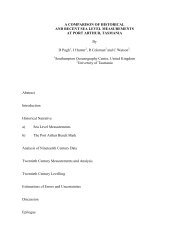Annual report 2005-06.indd - Antarctic Climate and Ecosystems ...
Annual report 2005-06.indd - Antarctic Climate and Ecosystems ...
Annual report 2005-06.indd - Antarctic Climate and Ecosystems ...
Create successful ePaper yourself
Turn your PDF publications into a flip-book with our unique Google optimized e-Paper software.
ocean control of carbon dioxide<strong>Antarctic</strong> Marine <strong>Ecosystems</strong> Program areexploring these processes through laboratoryexperiments <strong>and</strong> field studies. The resultswill be incorporated into computer modelsthat will allow us to assess the impact ofglobal change on marine ecosystems in theSouthern Ocean.• To develop simulations of futurescenarios of global <strong>and</strong> regional oceancarbon cycle dynamics. We will providetools to incorporate data from ACE CRC fieldprograms <strong>and</strong> other international researchefforts into regional <strong>and</strong> global assessmentsof potential changes in the ocean carboncycle. These assessments can assistAustralian <strong>and</strong> other governments in devisingeffective short- <strong>and</strong> long-term mitigation<strong>and</strong> adaptation strategies to future climatechange.OverviewThe ACE CRC CO2 Program is providinginformation to address two aspects of societalconcern about the impacts of rising emissions ofCO 2:• To what degree can uptake of CO 2by theocean help keep atmospheric levels of CO 2low?• How will the accumulation of our CO 2emissions in the ocean affect marineecosystems?These questions are global in scope, <strong>and</strong> cannotbe answered by any single research program,institution, or nation on its own. We have beenboth participants <strong>and</strong> leaders of long-terminternational programs (World Ocean CirculationExperiment [WOCE], <strong>Climate</strong> Variability &Predictability Study [CLIVAR], Joint Global OceanFlux Study [JGOFS], Surface Ocean – LowerAtmosphere Study [SOLAS], GEOTRACES <strong>and</strong>Global Ocean Observing System [GOOS]) <strong>and</strong>multi-national regional investigations (KEOPS,VERTIGO, SAFE, AMT, l’ASTROLABE). Our workhas received external funding from agencies inEurope, the United States <strong>and</strong> Asia.ACE CRC research in the CO2 Program hasmade major advances in the underst<strong>and</strong>ing<strong>and</strong> quantification of the role of the SouthernOcean in the control of atmospheric CO 2overthe past three years. We have educated 9 PhD<strong>and</strong> 3 Honours students in integrated, solutionfocusedcollaborative research of internationalquality. Our program has published more than30 refereed publications <strong>and</strong> book chapters, <strong>and</strong>provided many more presentations to research<strong>and</strong> public fora.Our research results are useful both ininternational assessment processes, suchas the Intergovernmental Panel on <strong>Climate</strong>Change for the assembly of global outlooks,<strong>and</strong> for Australian agencies addressing emissionmanagement <strong>and</strong> policy <strong>and</strong> planning for climatechange.Key achievements <strong>2005</strong>-06• Natural iron input studies: Quantification ofthe natural iron input from deep waters <strong>and</strong>sediments that fuels elevated phytoplanktonproduction over the Kerguelen plateau in theSouthern Ocean demonstrated that this inputleads to much greater transfer of carbon tothe ocean interior than has been observedin short-term artificial iron fertilisationexperiments (in collaboration with Europeanresearchers, Blain et al., Nature, in review).• Impact of sea ice on atmospheric CO 2exchange: We demonstrated that the longheldassumption that there is negligibleexchange of atmospheric CO 2exchange withsea ice covered oceans is incorrect, indicatingthat climate models must include bothphysical <strong>and</strong> biological aspects of sea ice gasdynamics to correctly simulate atmosphericcarbon budgets (in collaboration withEuropean researchers; Delille et al., Nature,in review).• Simulation of future ocean acidification as aresult of continued uptake of anthropogenicCO 2: This suggests there will be majorimpacts on carbonate-shell formingorganisms, <strong>and</strong> that the greatest effectsare likely to occur in <strong>Antarctic</strong> waters(in collaboration with US, European, <strong>and</strong>Japanese researchers, Orr et al., Nature,<strong>2005</strong>).• Ocean acidification monitoring: A program tomonitor the response of marine organisms toocean acidification has been initiated.28 <strong>Antarctic</strong> <strong>Climate</strong> & <strong>Ecosystems</strong> CRC - <strong>Annual</strong> Report <strong>2005</strong>-06








